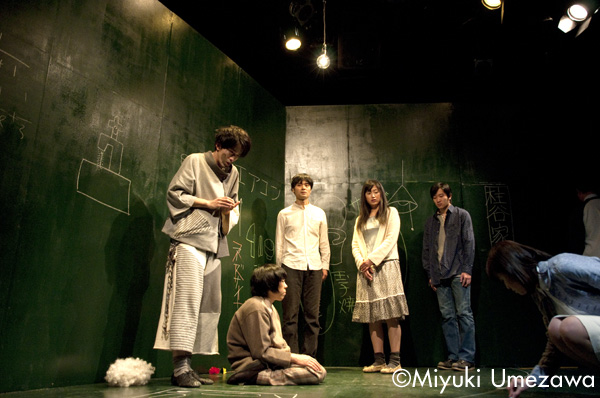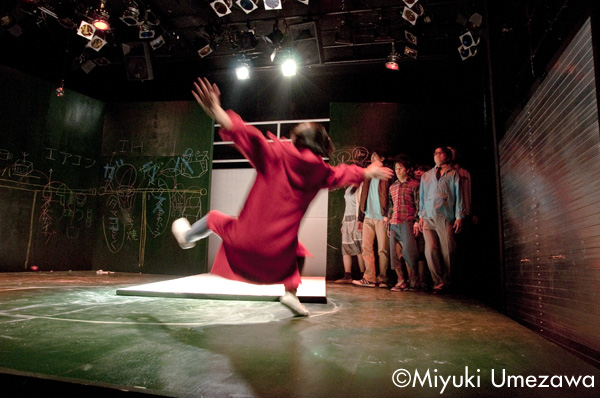Prologue: The daily routine of the part-time clown Taro Kimura is presented without a script. Taro draws the floor plan of his apartment on a blackboard. He changes into his costume and does simple magic tricks at the amusement park where he works, but it is so amateurish that even children don’t pay him any heed. That only one who delights in the paper flowers he makes appear is an old woman named Machiko who happens by. She happily takes one of the flowers with her as she leaves. After a pep talk from the disappointed boss you hired him, Taro’s spirits are low as he heads home at the end of the day. Near his apartment he finds the old woman from earlier in the day. She has fallen and Taro helps her up, and as she seems to have nowhere to go he invites her in to his apartment. After a while the two fall asleep.
The next morning, Taro learns that the old woman has sneaked out of a neighborhood nursing home and hurriedly tries to take her back to the home. When he sees how melancholy the idea of returning to the home makes her, however, he becomes sympathetic and eventually takes her back to his apartment.
From this point on the play follows a script.
Taro’s elder brother Haruo and his wife Shizuka come to Taro’s apartment. Noticing Taro’s reluctance to open the door and the hesitance in his answers from inside, Haruo asks with delights excitement, “Have you got a girlfriend?” Behind Haruo is his underclassman tag-along Kosuke who is always following Haruo around with an apologetic look on his demeanor. Haruo shoos him away like the nuisance he is.
As a side episode, a skit about a “Woman who can’t get on the bus” is acted out. As the woman bends down to draw the bus stop on the floor, stationary falls out of her backpack and scatters about. During the time it takes her to pick it up, the bus has come and gone. Scenes of her missing bus after bus in similar ways are repeated after this.
The play goes back in time to a scene at Machiko’s nursing home. Two of the caregivers, Ashita and Asatte are supervising the elderly residents as they play a bowling game. Ashita launches into a discourse on a pet theory he has: “What all human beings have in common is that they are born and die, and old age is one sort of stage in human growth. Considering the fact that our lifespan has gotten much longer than it was in the prehistoric Jomon Period, if human lifespan continues to grow like it has, there may eventually be a new stage of growth or evolution beyond old age.”
In time the two caregivers realize that Machiko is missing. They hurriedly go in search of her but she is nowhere to be found. For this lapse of duty the two are fired. Machiko’s daughter Masako is in tears with concern for her mother, and beside her is her own daughter Sakiko also looking worried.
Taro and Machiko are living harmoniously together. Despite Taro’s poor performance in his job, the new employee at the amusement park office named Wataru likes him, and their boss, Hanamaru, doesn’t seem to appreciate that.
On his way home from work, Taro runs into a former high school classmate, Midori. It turns out she married to their former teacher, Hashiratani. They are living nearby and Midori tells Taro she is expecting a child. Taro was an introverted child at school and he only has bad memories of the pressure he felt from the domineering Hashiratani. On returning home, Midori tells her husband about seeing Taro, but there appears to be a communication gap between the couple.
Another person claiming to be a neighbor approaches Taro, speaking to him in English. The man acts excessively friendly and gives Taro his telephone number, saying to give him a call if he ever needs help with anything. Taro is feeling irritated as he opens the door to his apartment but is comforted by Machiko’s greeting.
Several days later, Taro’s brother and wife and Kosuke are standing in Taro’s room. They are surprised to find that what they thought was Taro’s new girlfriend is in fact an old woman. Machiko’s dementia is getting worse and there is incoherence in her speech and actions. It appears that Taro is taking time off from work in order to care for her. As Taro and his brother, wife and Kosuke stand speechless as if frozen in shock, Wataru arrives from the amusement park. He has come out of concern for Taro’s unexplained absence from work.
With this, Wataru has also found out about Machiko and Taro living together. Learning that a missing persons notice has been filed for Machiko and Taro might be charged with a criminal offense for hiding her, everyone tries to convince him to take her back to the nursing home. But Taro is stubbornly determined to keep her with him, even if it is just to care for her in her dementia.
From time to time the story line is interjected with scenes of Machiko’s daughter Masako and her daughter Sakiko worrying about the safety of Machiko and scenes of the Hashiratani couple’s ambiguous conversations about their coming child.
Meanwhile we see changes in Taro’s room. He has put safety hold-railings along the walls and an electric-tilt bed for Machiko.
Out of work and on the streets now, Ashita and Asatte find out that Taro is keeping Machiko in his apartment. Motivated by the desire to lessen his debt to Haruo in any way he can, Kosuke goes off saying that he is going to prevent the Taro’s discretion from becoming known.
At the Hashiratani home, Midori is talking about her joy at prospect of having a baby soon. Unable to hold the truth back any longer, Hashiratani announces to her that he is in fact sterile.
Taro and Machiko are having a meal in his apartment, as Haruo and Wataru stand looking on. Machiko no longer knows who Taro is. Still, Taro refuses to listen to his brother’s pleadings that he take her back to the home. In fact, Taro is already reaching his limits, both financially and psychologically.
Taro has asked Wataru and Hanamaru to lend him money, but he has been refused. Taro returns home to find that Machiko has made a mess of his room in his absence and is trying to eat her own feces.
To stop Ashita and Asatte from informing on Taro, Kosuke has threatened them with violence, which has angered Haruo toward him even more.
At the Hashiratani home, the devastated Midori has slit her wrists in a suicide attempt.
At the amusement park office, Hanamaru is feigning sudden illness in an attempt to prevent Wataru from going to the hospital to visit her.
“This can’t go on any longer,” says Haruo to Taro. “It can’t go on because it is no longer your problem alone.” When even this plea fails, Wataru also gives up on Taro.
As Machiko sleeps, her tiny body curled up in a ball, Taro weeps as he says to her, “What are you, little Machiko” Where are you headed? Where should I be headed?”
As he draws his face close to Machiko as if to kiss her, Machiko suddenly wakes up and thrusts him away. The two stare at each other. Finally, Machiko takes out a cleansing sheet and begins to wipe the clown’s makeup from Taro’s face. Ravel’s
Bolero
begins to play as background music.
Taro take the sheet from Machiko and begins to wipe off his clown’s makeup. Machiko spits on her hand and smoothes Taro’s hair into place. Then she slaps him and leaves the stage. Soon Taro is surrounded by people whaling complaints about old age and fatigue.
Haruo comes to report that Machiko has returned to the nursing home. Taro tells his brother that he is going to turn himself in to the police. He takes off his clown’s costume and dresses himself in a suit. Around him, all the people that have appeared in the lay thus far gather and perform a dance to the music of Ravel’s
Bolero
. The dance depicts the process of evolution from apes to human beings, bringing to mind various thought about the meaning of evolution.
Now in his suit, Taro erases from the floor the lines that had separated his room from the outside world and then proceeds to write on the wall the characters GA LA PA KO SU before going to the bus stop. At the bus stop, Taro is joined by Wataru and the “Woman who can’t get on the bus.” When we hear the sound of the bus approaching, the “Woman who can’t get on the bus” step out in front of the bus to stop it and it drives over her.
Concerned people run up to find that the Woman has miraculously survived unhurt. She proceeds to get into the bus, to the relieved smiles of the driver and the other passengers. With a tense expression, Taro knocks on the door of the bus and gets in. Looking uncomfortable but determined, Taro sits in his seat, joggled by the movement of the bus with the expressionless passengers around him. Taro has taken the next step in his life.
Epilogue: The passengers in the bus are singing “We Are The World” in chorus. Although he has a hard time getting into the mood of the music, Taro raises his voice and tries his best to join in with the others.




